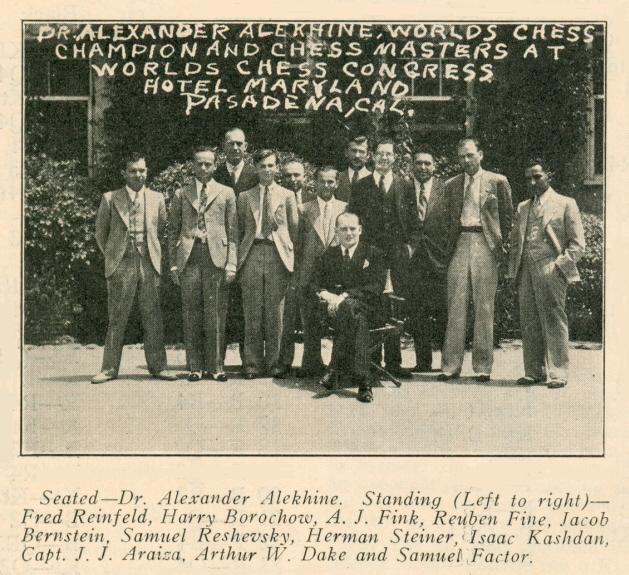
Edward Winter

See C.N. 5543.
According to a number of books, the late Reuben Fine once lost a tournament game in seven moves. The score of Harry Borochow v Reuben Fine, Pasadena, 1932 is often said to be: 1 e4 Nf6 2 e5 Nd5 3 c4 Nb6 4 d4 Nc6 5 d5 Nxe5 6 c5 Nbc4 7 f4 Black resigns.
Page 436 of the August 1978 Chess Life & Review published a letter from G.S.G. Patterson, the President of the Pasadena, 1932 International Chess Congress, reporting that the actual moves were: 1 e4 Nf6 2 e5 Nd5 3 d4 Nc6 4 c4 Nb6 5 d5 Nxe5 6 c5 Nbc4 7 f4 e6 8 Qd4 Qh4+ 9 g3 Qh6 10 Nc3 exd5 11 fxe5 Black resigns.
Patterson’s letter specifically corrected Larry Evans, who had affirmed (Chess Life & Review, October 1977, page 557) that Fine won the game. Even so, in a book published several years later – The Chess Beat – Mr Evans repeated, in large bold letters, his claim that ‘Black won’ (after 7 f4 e6), adding ‘But Chernev says Black resigned!’ (page 24). For our part, we see no reason to doubt G.S.G. Patterson’s version of the score. Mr Evans’ unaccountable assertion that Fine won is refuted by the tournament crosstable.
(1968)
Val Zemitis (Davis, CA, USA) sends us a copy of a 1984 card he received from Harry Borochow (1898-1993) regarding the Borochow-Fine brevity played at Pasadena, 1932.
Borochow states that the correct score is: 1 e4 Nf6 2 e5 Nd5 3 c4 Nb6 4 d4 Nc6 (‘??’) 5 d5 Nxe5 6 c5 Nbc4 7 Qd4 (‘!’) e6 8 Be2 [Sic. 8 f4 must be meant.] 8...Qh4+ 9 g3 Qh6 10 Nc3 Black resigns. He added the following note (given here in the algebraic notation):
‘4...e6 or ...d5 were the only moves ever played. 7 Qd4 wins two pieces or the queen. In 1000 Best Games, he [Chernev] thought shortening it to only pawns against knights was a good theme, but 6 c5 loses, for 6...Qh4+ 7 Ke2 Qe4+ wins a rook. When Fine played 4...Nc6, I saw the entire combination almost at once, but studied for 15 minutes, thinking Fine had found a new move!’
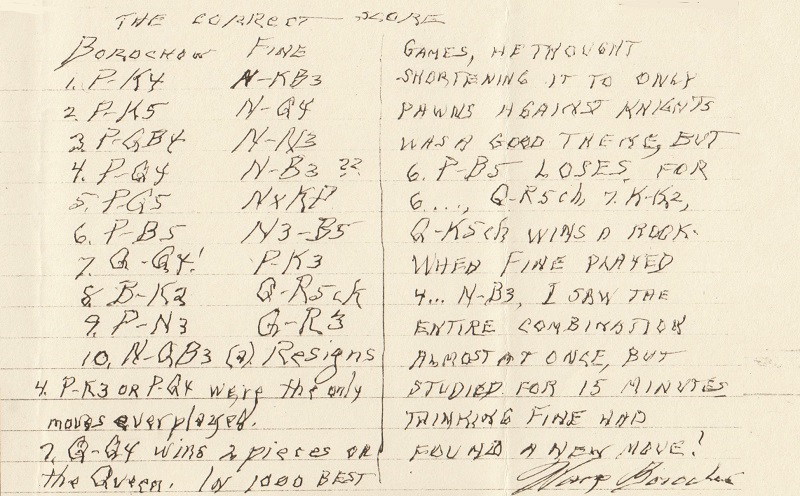
Borochow’s remark that 6 c5 loses in the game version published by Chernev is evidently based on the misapprehension that White has already played f4. Concerning the inscrutable ‘8 Be2’, it may be noted that in 1984 Mr Zemitis took a photograph of Borochow posing behind the final position; the white bishop is still on its home square:
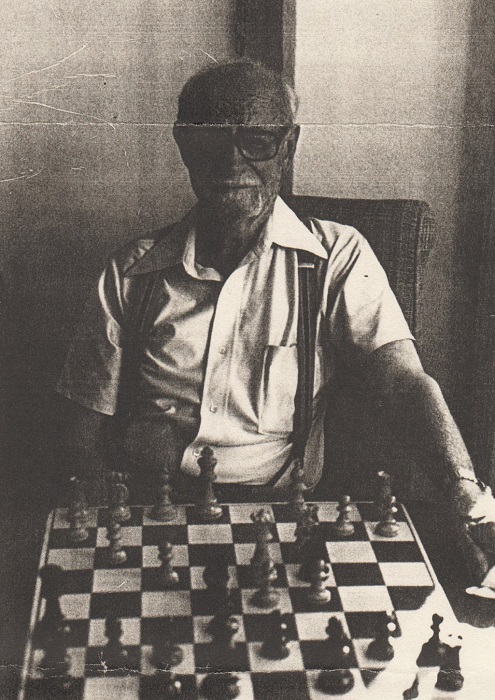
(2084)
Val Zemitis (1925-2012) sent us the above game-score and photograph on 14 March 1995, together with a cutting from Douglas S. Houghton’s chess column on page 9 of the Pasadena Star News, 27 August 1932:
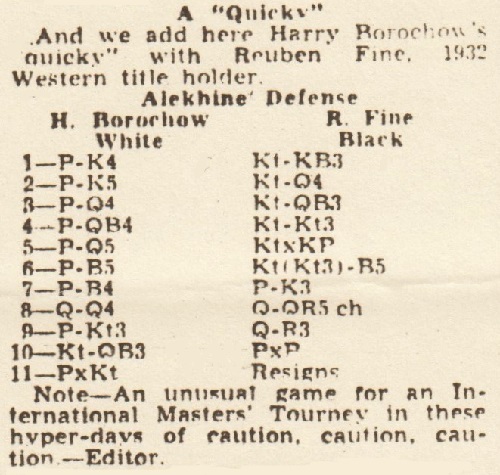
Mr Zemitis added that according to Borochow the game-score was incorrect.
Earlier, in a letter dated 5 July 1993, our correspondent had provided background information on his contact with Borochow:
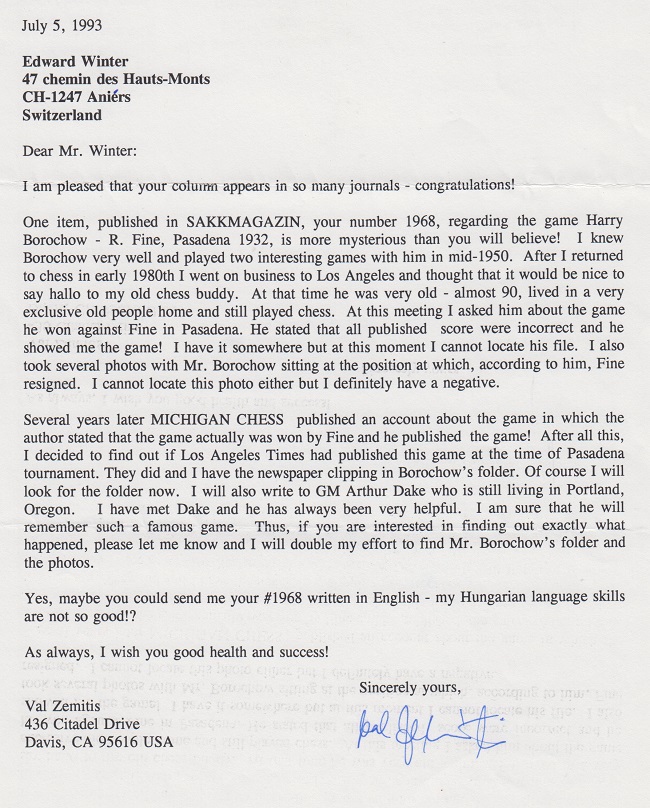
As noted on page 315 of Kings, Commoners and Knaves, Val Zemitis wrote further about the game on pages 22-23 of Inside Chess, August 1998.
A comment about the game from page 145 of How to Play Chess Like a Champion by Fred Reinfeld (New York, 1956):
‘This is the most remarkable tournament game – certainly the shortest – ever won by an amateur against a first-class master. The chances are slight indeed that such a feat could ever be equaled.’
(9399)
From our feature article on Larry Evans:
Following the publication of two game positions in the December 1999 Chess Life we wrote to the magazine:‘If “Evans on Chess” is to lift work from my Chess Notes (i.e. the Borochow and Junge items in the December 1999 Chess Life) would it not at least be possible for that to be specified and for the material to be used accurately?’
This complaint, published in the correspondence column of the February 2000 Chess Life, was straightforward: his December 1999 column had included two positions (from the games Borochow v Fine, Pasadena, 1932 and N.N. v O. Junge, Concepción, circa1909) taken, a reader in the Philippines said, from ‘our local magazine Chess Asia’. The fact that they were culled from Chess Notes (which, at that time, Chess Asia was still publishing) was given no mention whatsoever.
One of the two positions discussed above deserves a separate section here. The famous miniature between Borochow and Fine at Pasadena, 1932 is yet another example of how facts in Evans’ hands stand no chance. This is shown by C.N. 1968, in which we wrote:
According to a number of books, the late Reuben Fine once lost a tournament game in seven moves. The score of H. Borochow v Reuben Fine, Pasadena, 1932 is often said to be: 1 e4 Nf6 2 e5 Nd5 3 c4 Nb6 4 d4 Nc6 5 d5 Nxe5 6 c5 Nbc4 7 f4 Resigns.
Page 436 of the August 1978 Chess Life & Review published a letter from G.S.G. Patterson, the President of the Pasadena, 1932 International Chess Congress, reporting that the actual moves were: 1 e4 Nf6 2 e5 Nd5 3 d4 Nc6 4 c4 Nb6 5 d5 Nxe5 6 c5 Nbc4 7 f4 e6 8 Qd4 Qh4+ 9 g3 Qh6 10 Nc3 exd5 11 fxe5 Resigns.
Patterson’s letter specifically corrected Larry Evans, who had affirmed (Chess Life & Review, October 1977, page 557) that Fine won the game. Even so, in a book published several years later – The Chess Beat – Mr Evans repeated, in large bold letters, his claim that ‘Black won’ (after 7 f4 e6), adding ‘But Chernev says Black resigned!’ (page 24). For our part, we see no reason to doubt G.S.G. Patterson’s version of the score. Mr Evans’ unaccountable assertion that Fine won is refuted by the tournament crosstable.
This text was reproduced on pages 314-315 of Kings, Commoners and Knaves, together with C.N. 2084. That latter item (which was the basis of what appeared in Evans’ December 1999 column) reported on the researches by a correspondent of ours, Val Zemitis. Mr Zemitis also had a brief note published in Evans’ May 2000 column, in which he expressed the belief that the game had indeed lasted eleven moves ‘instead of the seven as cited by Irving Chernev’. The intriguing point here is Evans’ rejoinder: ‘You can’t take all of Chernev’s “facts” too seriously.’
Unlike Evans’ ‘facts’, perhaps? Chernev had indeed been wrong (in a book published back in the mid-1950s) to give a seven-move version of the game, but at least he had correctly stated that it was White who won. Question: which author claimed in 1977 that it was Black who won? Answer: Evans. Question: which author was publicly corrected on this point in 1978? Answer: Evans. Question: which author nonetheless maintained in a 1982 book that Black won? Answer: Evans. Question: which author scoffed at that time, ‘But Chernev says Black resigned!’? Answer: Evans. Question: which author nonetheless has the gall to criticize Chernev for inaccuracy regarding this game? Answer: Evans.
To the Chess Notes main page.
To the Archives for other feature articles.
Copyright: Edward Winter. All rights reserved.